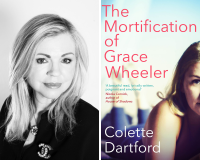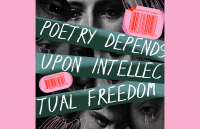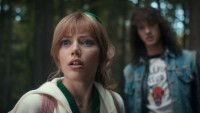
Five dos and five don’ts of writing (or how to get ahead in the literary world)
irishtimes.com – Thursday August 25, 2022

Do think about your legacy A great many female writers have been ‘reclaimed’ in the past few years, but God forbid that ever happens to me. Reclamation is like having your corpse exhumed by an academic for forensic purposes. To avoid this, I plan to keep publishing in perpetuity. I’ve already given the Linenhall Library a novel to be released after my death on January 1st, 2070 – save the date!
Don’t fall prey to those sombre enemies of art that can distract you at every turn These days, it’s not the pram in the hall that will prevent you, but the phone in the pocket, the Google on the PC, the beeping text or Twitter. To paraphrase the Timothy Leary sixties anthem, ‘Turn off, tune out, log out’. Don’t waste your time tweeting because it’s not like a literary letter and no one’s going to publish your Collected Tweets Vols I and II. Twitter is more ephemeral than a mayfly’s breath. Instead, live the literary dream and exude writing: breathe it, bleed it, breed it, even eat it. For instance, if you come to my house tonight, I’ll be serving Flan O’Brien for starters, followed by Irish Stew-art Parker, topped off with Donna Tartt and custard.

What Five Years with a Predatory Vanity Press Taught Me About Art and Success
lithub.com – Tuesday August 23, 2022

Every few months, I receive an email or phone call from someone who claims to work for a literary agency or publishing entity. In the lengthy messages variegated with bold-faced sentences, or voicemails in which the speaker mispronounces my maiden name, I’m promised six-figure book deals with Simon & Schuster or Penguin Random House (“Yes, mmhmm that’s correct, Penguin,” one woman repeated in her message). I’m told that I will be represented to their network of mainstream filmmakers and that authors who have “partnered” with these publishers or agents have been New York Times and USA Today Bestsellers.
But these messages have nothing to do with the novel I’m actively querying. Instead, I’m told that a book I wrote as a teenager, self-published through an extinct vanity press and now buried in the library of obscure titles on Amazon, is the reason for their interest.
When I was seventeen, I sent the first book of a YA fantasy series to a publishing company I found through a Google search. The website had an ad video from Miss Oklahoma, vouching for the integrity and Christian principles of the press. My mom answered the phone when they called one afternoon of my senior year. The acquisitions editor told her my book had great potential and promised a full-scale publishing deal and marketing campaign. She failed to mention any expenses on our part, instead dropping the sum of $30,000, the amount the publisher would commit to me. She guaranteed my book’s success. When my mom rushed to tell me, we could barely contain our disbelief and excitement until my dad got home.
I remember his words for it: “It almost seems too good to be true.”

Colette Dartford on writing believable characters
culturefly.co.uk – Saturday August 20, 2022

As a reader I have a hundred-page rule, which means that if I’m indifferent to the main characters and what may become of them at that point, I don’t read any further. Some people find this heretical (two members of my book club, for example) but honestly, what’s the point? There are so many wonderful novels out there, and with so little free time, I feel entirely justified cutting my losses and moving on.
It’s quite a different matter, however, when I look at it from the other side, as a writer. Then I am acutely aware that the characters I create must be complex but believable, flawed but likeable, unpredictable but relatable. Not so easy now, I tell myself, staring at my laptop screen, longing for inspiration. The namesake of my latest novel, The Mortification Of Grace Wheeler, is a case in point. Grace is conventional, undemanding, not one to make a fuss. The danger in writing such a character is that initially they may come across as dull and uninteresting. My task is to peel back the layers of her apparent ordinariness and expose the contradictions that swirl beneath. For example, Grace’s husband, Cal, is much older than her and the age gap has become a gaping chasm. A lifelong Tory who voted for Brexit, she considers him staid and old-fashioned, yet when their son introduces his first girlfriend, an exotic creature with multi-coloured hair, a nose stud and tattoos, it is Grace who is quietly shocked and disapproving. Cal finds her an absolute hoot. Similarly, having been raised by a devoted single mother who often struggled to make ends meet, Grace prizes the stability of her twenty-year marriage and the security of her modest but comfortable home.

Writing a Romance versus Writing a Mystery
crimereads.com – Wednesday August 17, 2022

Is there that big a difference between falling in love and solving a murder?
Um, yes, there is, especially when writing about love and murder. For me, it’s not just about content but about the craft and process of writing in those separate genres. I find it fascinating that although I’ve been writing for over twenty years, my beginning process for writing cozy mysteries is vastly different than it is for writing in the romance genre.
I started writing romances because I love to read them. It’s not a billion dollar industry for nothing! Comprised of formulaic and original plots, as well as a guaranteed happily ever after (HEA,) the genre breeds voracious readers who want engaging lead characters, a romantic main plot, and that all-important HEA (or HFN—happily for now, which has become accepted in the genre.)

Unwritten — The crisis in creative writing
honisoit.com – Monday August 15, 2022

When she sat down to craft her debut novel in 2020’s lockdown, months after finishing her undergraduate degree, Diana Reid had never considered a career in writing before. An incisive debut about the interplay of sexuality, feminism, and power at an Australian university campus, Love and Virtue (2021) surfaced to overflowing critical acclaim and was named Book of the Year by the Australian publishing industry in June.
But, in hindsight, it very well might not have been written.
“It kind of terrifies me, actually,” Reid says. “I was so dependent on this very freak circumstance [lockdown] before I actually sat down and opened a blank word document.”

Writers and Liars: On Fact, Fiction, and Truth
lithub.com – Sunday August 14, 2022

I’ve often heard authors say that fiction is merely lies. George R. R. Martin has said that “we’re writing about people who never existed and events that never happened…[a]ll those things are essentially untrue.” Norman Spinrad characterizes these fictional lies as differentiating the genre from “biography, history, or reportage.” The list of writers with this viewpoint goes on and on. There’s even a fiction writing group, for whom I once had the pleasure of being a guest speaker, called the Pocono Liars Club.
It’s not hard to understand this perspective. As a novelist, I do make things up for a living. But I believe the job of the author is to tell emotional truths, and that the best way to do that is rarely by relaying facts and figures or repeating events just as they happened. Journalism and documentaries have an important place and often use the same toolbox as fiction does, however, fiction is uniquely suited to truth-telling because humans have storytelling baked into our DNA. We understand the world best through stories, and these are an incredible way to arrive at something approaching a universal truth.

Why We Need Independent Publishers
newsletters.theatlantic.com – Tuesday August 9, 2022

Along with most everyone I know who works in or otherwise relies on book publishing for their livelihood, I’ve been following the Biden administration’s antitrust case against the proposed Penguin Random House/Simon & Schuster merger. Last week, as John H. Maher of Publishers Weekly live-tweeted us through the opening days of the trial, my timeline was filled with [skull-emoji] quote-tweets of things that many of us aren’t used to hearing folks in publishing say out loud. PRH lawyers have argued that “after the merger, the market dynamic will be just the same,” while the DOJ maintains that combining two of the “Big Five” publishers into one would decrease the number of offers an author might receive, lower book advances, and make it harder for writers to support themselves. In a pretrial brief, the DOJ stated that if the merger goes forward, it “would … give the merged company control of nearly half of the market to acquire anticipated top-selling books from authors”—a point underlined by Stephen “My name is Stephen King, I’m a freelance writer” King when he took the stand last Tuesday. “Consolidation is bad for competition,” he said.

8 Steps to Follow When Writing an Early Death Scene
nofilmschool.com – Tuesday August 9, 2022

Do you want a supporting character's death to be impactful? Then follow these steps!
The fourth season of Netflix's Stranger Things introduced many new characters that we quickly learned to love or despise. While many side characters feel like archetypes rather than fully formed characters, one stands above the rest because of how impactful her story and death were.
Although Chrissy Cunningham’s (Grace Van Dien) story is incredibly short, lasting only a single episode, her impact on the main characters and viewers was undeniable. In five scenes, the audience empathized with Chrissy’s trauma and hardships and even swooned over her blossoming friendship with Eddie (Joseph Quinn), all to watch her die a horrific death.
How did the writers maximize Chrissy’s story to get such a high emotional payoff with her death scene? Schnee breaks down what to focus on when writing an early death scene that has a lingering effect on the rest of the main story, and how you can approach an early death in your next project.

The Art of Accidentally Writing a Thriller
crimereads.com – Tuesday August 9, 2022

Let me start by admitting something that may be a little shameful, a little anathema, on a site like this: I’m not a crime fiction aficionado. Honestly, I read other genres much more extensively. I’ve never read Agatha Christie (gasp!), Lee Child, Gillian Flynn, Harlan Coben, Dean Koontz, James Patterson, John Grisham etc. Sadly, the list goes on. Are you still reading? Am I still invited to this club? Maybe, maybe not.
Let me also say, I fully enjoy the thriller/crime/mystery genre. I love Tana French, Kate Atkinson, and Val McDermid; I especially enjoy thrillers that toe the line between other genres like Julie Phillips’ Disappearing Earth or Jeff Vandermeer’s Annihilation. But I don’t read fiction to watch car chases, solve clues, or guess who dunnit. The truth is, I often don’t really care. Oh man, I AM gonna get kicked out of this club! Let me explain.

Why I Chose Travel Writing As My Retirement Career
travelawaits.com – Monday August 8, 2022

I love to work, explore new possibilities, get out of my comfort zone, live a full and exciting life, and hang out with my husband. I chose travel writing as my retirement career so I could enjoy all those things and live a good life.
Get the free newsletter | Submit a news item or article | Get Writers' News for your website





